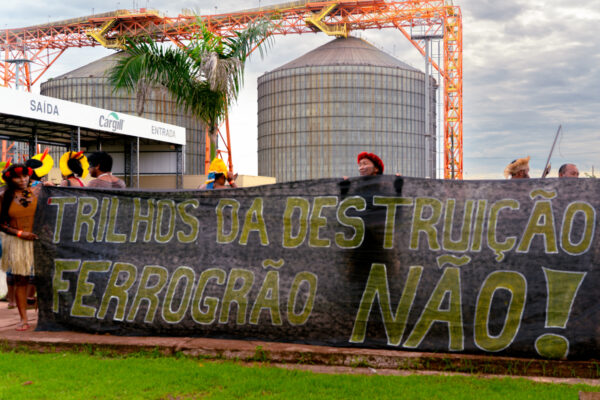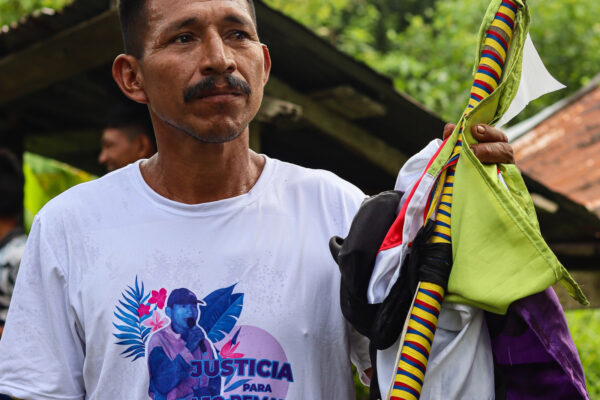Lima, Peru – A law that Peru’s indigenous leaders fought for two years to get passed and the government says could end strife over natural resources may not resolve conflicts as hoped when it goes into effect in January.
Leftist President Ollanta Humala signed the “consultation law” earlier this month, requiring firms and the state to try to reach a consensus with tribes and rural towns before building mines, drilling for oil or enacting legislation that affects their lands.
Humala, who took office in July promising to better serve the rural poor, has said more dialogue with people in rural communities could end debilitating conflicts and quell opposition to extractive industries that threatens some $42 billion in investment planned for the next decade.
More than 100 protesters have died in the past few years in clashes with police.
The law puts Peru in compliance with the U.N.’s Indigenous and Tribal Peoples Convention, which it ratified in 1994. Advocacy groups say it is a triumph for indigenous rights and companies hope it will help them win approval for projects by improving community relations.
But Mario Palacios, an indigenous leader who lobbied for a consultation law for two years as head of the National Confederation of Communities Affected by Mining, said the law as passed has a big loophole in that it will only apply to future projects. That means it could dash raised expectations in some 200 towns that have organized to halt mining and oil projects that have already been approved.
Prime Minister Salomon Lerner confirmed at a press conference on Wednesday that the law could not be applied “retroactively.”
“Many communities are waiting for consultation and there could be a reaction when they don’t get it,” Palacios said. “In the first stage I suspect there will be more conflicts, though the law could reduce them over the long term.”
Palacios, who is advising a government agency on how to implement the law, told Reuters 21 million hectares (52 million acres) in the Peruvian Andes have already been granted as concessions to mining firms and many were awarded without consulting nearby towns.
Large blocks of the Amazon are also carved into oil concessions.
Palacios said it was “absurd” that the law wouldn’t apply to holders of these concessions.
Indigenous communities have opposed mines and oil wells out of fear they will lose their ancestral lands or their water sources will be contaminated. Companies meanwhile say their projects bring development to Peru’s poor hinterland.
With commodities prices high, investors are eager to enter ever more remote areas in lesser explored emerging markets like Peru.
Though the country has long been a top global metals producer and has growing oil and natural gas industries, the government has struggled to manage the influx of investments.
Former President Alan Garcia aggressively courted foreign investors and helped turn Peru into one of the world’s fastest-growing economies – only to see his term marred by social conflicts.
The low point of his presidency came in the jungle town of Bagua where, two years ago, tribes opposed to mining and oil drilling in the Amazon clashed with police in a melee that killed 33 people.
Implementation Key
Despite mass mobilization for a consultation law after Bagua, Garcia refused to sign the bill passed by Congress, saying it would give communities the right to “veto” projects that would benefit all Peruvians.
A revised bill signed by Humala, in contrast, says companies must try to reach an agreement and stops short of allowing communities to turn away projects.
That lack of community veto power allowed businesses to cautiously support the law, which Congress unanimously passed in August.
“With good implementation this could be a great opportunity to be able to really begin to bring mining to zones with potential,” said Evangelina Arias of the national association of mining and energy companies.
The corporate group says the law’s success will depend on how it gets put into practice. It urges government to form a registry of indigenous towns and their legitimate leaders who must be consulted. The state must also ensure that consultation does not hold up investment with more red tape, companies say.
Communities are waiting to hear how it will apply to them.
In the remote northeastern region of Loreto, native Shuar people are attempting to blockade exploratory drilling by Talisman Energy, which could not be reached for comment.
The Shuar complain that prior consultation did not take place and demand the Canadian company leave the area. Samuel Sunta Mayak, a Shuar spokesperson, was uncertain about the impact the new law would have in the area.
“The problem is that the population was not consulted, but we don’t have anyone who knows this law well,” he told Reuters.
“We are particularly concerned about how we can make the government or the company complete this consultation.”













